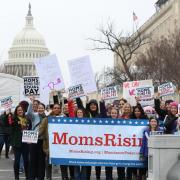Worthy wages now: For our children, our families, and our economy
Moms know just how very valuable early learning is for kids, for families, and for our economy. More than anything, we want our children, and every child, to have every chance to succeed in school and in life. High-quality early learning programs are critically important to children’s success. In fact, research shows these programs lead to better results in school and to better health, social behaviors, and employment prospects later in life. These programs also give parents the peace of mind that comes with knowing that their child is in good hands while they’re at work.
Yet despite the critical role these early learning teachers and child care providers play in our children’s lives, their average wages are just $10.72 per hour.
Imagine trying to get by on $22,310 per year, which is what $10.72 per hour translates to year-round. We count on these early learning providers to care for our children, yet the industry doesn’t pay them near enough to care for their own loved ones.Some 95 percent of early learning providers are women, and 40 percent are people of color. Many are parents as well — and nearly two-thirds of child care providers with at least one child under 18 have had to turn to public support programs to make ends meet.
This is unacceptable and unfair.
Low wages are unfair to providers and their families and are bad for childcare programs, too. Poor compensation makes it difficult to recruit and retain qualified workers — those with higher levels of education will leave for jobs with better pay and better benefits. For example, MomsRising member Elizabeth, a childcare worker in Colorado, said she cannot afford health coverage despite working 40 hours a week at her childcare facility, and an additional 40 hours babysitting. She has a bachelor’s degree and took extra courses to qualify to work for a highly-rated childcare center because of her passion for helping young children. But now, after seven years, she’s considering a career change so she can earn a living wage.
Teacher turnover is also bad for children. Amy, from Vermont, said her 3-and-a-half-year-old son has had 20 teachers in his time at his childcare center. Four of his favorite instructors left due to poor pay, limited benefits and unsuitable working conditions. “He still talks about them all and I think those transitions have had a permanent effect on him,” she said.
An overwhelming majority of voters say that making affordable, high-quality childcare more accessible should be a priority for our elected leaders. Moms agree! Any policy increasing access to high-quality childcare must also address compensation for early learning providers. Higher wages will help providers care for their own children as well as ours, improve recruitment and retention rates at child care centers, and increase the quality of early learning programs.
It’s one of the best things we can do for our children, our families and our economy.
Originally published at the AFT blog.
Kristin Rowe-Finkbeiner is the Executive Director/CEO and Co-Founder of MomsRising and Board President of the MomsRising Education Fund. She is also an award-winning author of books and articles, frequent public speaker, media contributor, and host of the radio program “Breaking Through with Kristin Rowe-Finkbeiner (Powered by MomsRising).” Kristin is also a former political director, policy analyst, and political strategy consultant for non-profit organizations and foundations.



The views and opinions expressed in this post are those of the author(s) and do not necessarily reflect those of MomsRising.org.
MomsRising.org strongly encourages our readers to post comments in response to blog posts. We value diversity of opinions and perspectives. Our goals for this space are to be educational, thought-provoking, and respectful. So we actively moderate comments and we reserve the right to edit or remove comments that undermine these goals. Thanks!